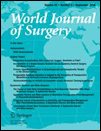The Effect of Preoperative Pneumonia on Postsurgical Mortality and Morbidity: A NSQIP Analysis
Abstract
Background
Currently, only indirect evidence suggests that preoperative pneumonia is a significant risk factor for poor postsurgical outcomes. Although this relationship is clinically intuitive, this is the first study that aims to quantify the extent to which pneumonia impacts morbidity and mortality. The objective of this study was to determine the impact of preoperative pneumonia on 30-day mortality and morbidity among both elective and emergency surgical patients.
Methods
We conducted a retrospective cohort study using 2008–2012 data from the American College of Surgeons National Surgical Quality Improvement Program database. Patients with preoperative pneumonia were matched to controls without preoperative pneumonia. Patient demographics and postoperative outcomes were extracted from the database, including 30-day mortality, specific morbidities (wound, cardiac, respiratory, urinary, central nervous system, thromboembolism and sepsis), composite morbidity, number of blood transfusions and number of patients that returned to the OR. Mortality and composite morbidity were further stratified.
Results
We obtained data for 137,174 patients, of whom 6933 (0.50%) had preoperative pneumonia. Overall, 6111 were successfully matched to 24,444 patients with no pneumonia. Postoperative mortality and composite morbidity were both higher in patients with pneumonia than in those without pneumonia, with an odds ratio of 1.37 (95% CI 1.26–1.48) and 1.68 (95% CI 1.58–1.79), respectively.
Conclusion
Preoperative pneumonia significantly increased the rate of postoperative morbidity and mortality across several surgical settings and patient groups. It is our recommendation that elective surgery be delayed until after the pneumonia resolves.




